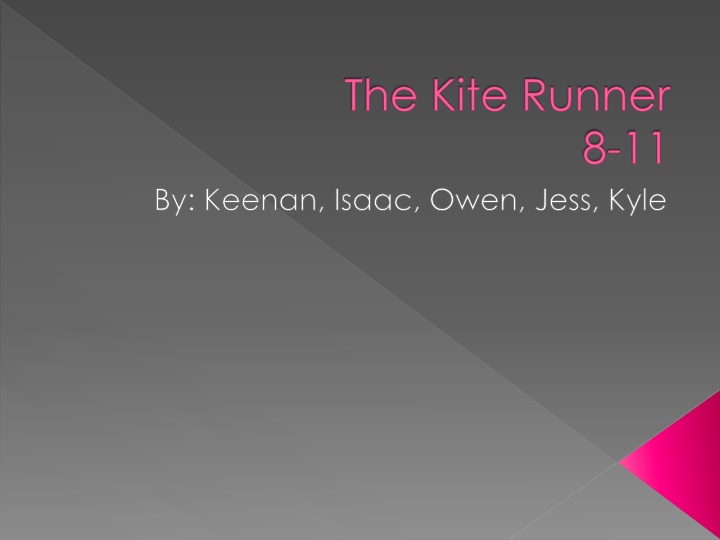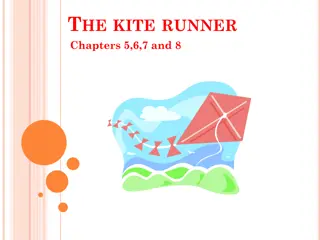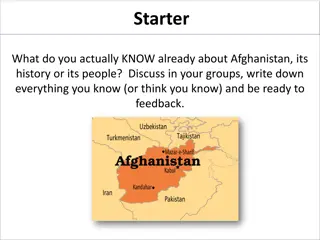Analysis of "The Kite Runner" Chapters 8-11: Loyalty, Irony, and Motifs
In Chapters 8-11 of "The Kite Runner," key events include Amir lying, betraying his friend Hassan, and the family fleeing Afghanistan. The analysis discusses themes of loyalty, irony, and motifs like blood and pomegranates, highlighting the complex relationships and character dynamics in the novel.
Download Presentation

Please find below an Image/Link to download the presentation.
The content on the website is provided AS IS for your information and personal use only. It may not be sold, licensed, or shared on other websites without obtaining consent from the author.If you encounter any issues during the download, it is possible that the publisher has removed the file from their server.
You are allowed to download the files provided on this website for personal or commercial use, subject to the condition that they are used lawfully. All files are the property of their respective owners.
The content on the website is provided AS IS for your information and personal use only. It may not be sold, licensed, or shared on other websites without obtaining consent from the author.
E N D
Presentation Transcript
The Kite Runner 8-11 By: Keenan, Isaac, Owen, Jess, Kyle
Key Points from Chapter Amir lies to Ali about Hassan s rape Amir throws pomegranates at Hassan waiting for a response Amir frames Hassan for stealing his watch and money Ali and Hassan quit their job and leave Baba Baba and Amir flee Afghanistan due to Russian invasion Amir Graduates high school in America
Literary Devices Hassan s reply was a single word, delivered in a thin, raspy voice: Yes I flinched, like I d been slapped (Hosseini 105). This is an example of irony because Amir was waiting for Hassan to say he didn t steal it but Hassan s loyalty showed again when he took the blame. This is ironic because Amir was expecting to get caught but even after how he treated Hassan, he still covered for him one last time.
Literary Devices Another thing that is ironic is how in Afghanistan, Amir and Baba were extremely wealthy and had lavish things but once they moved to America they lived in the hood and had to live off welfare. This is ironic because it shows how drastic their lives can change and become opposites.
Motifs Blood The spokes were gold colored and the steel- frame body red, like a candy apple. Or blood. (Hosseini 101) This is something that reoccurs though out the story, the idea of blood. He talks about the bloody hand in his dream, Hassan s bloody hands and Hassan s face smeared in pomegranate like blood. The idea of blood represents pain, which essentially is what Amir causes Hassan, and the sign of blood everywhere can show Amir s guilt for the pain he caused Hassan.
Motif I hurled the pomegranate at him. It struck him in the chest, exploded in a spray of red pulp. (Hosseini 92) The pomegranate also is reoccurring in the story. It represents the fruit of Islam and is mentioned frequently in Amir s childhood. Amir and Hassan sit under pomegranate trees and read which shows their friendship, then later shows the hatred appointed at Hassan by Amir.
Themes Loyalty of others is not always going to turn out in one s best interest. This is a theme because Hassan is frequently loyal to Amir even though Amir is wrong and in the end Hassan keeps getting disrespected and taken advantage of.
Themes A guilty conscience can ruin one s happiness and affect others. This theme can be explained because Amir is so guilty about all the pain he caused Hassan and cannot bare looking at him. Even though Amir s life is going great he cannot enjoy the things in life because he conscience is making him miserable. By Amir acting this way Hassan is affected too and unhappy with the way Amirs treating him, thinking he did something wrong.























